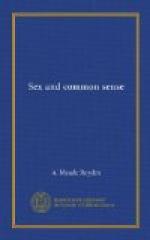It may be contended that in this spiritual interpretation of Christ’s commands it is very easy to go too far and “interpret” all the meaning out of them. It is certain, however, that the danger must be incurred, since nothing could make sense out of an absolutely literal interpretation. It would mean a reductio ad absurdum.
Apply such a literalism, for example, to the point at which for centuries the Church has sought to apply it—the indissolubility of marriage. It is admitted that since a phrase, of however doubtful authority, does make an exception in favour of divorce for adultery, the Church can recognize a law in this sense. But if we are to be literalists, it seems that a lustful wish is adultery! Is this to be a cause for divorce? And if not, why not? Obviously because we can no more apply such spiritual teaching literally than we can take a man out and hang him because he hates his brother! There we cease to be literal: how then can we fall back on a literal interpretation at another point?
I claim that there is no ground whatever for a more rigid and legal interpretation of our Lord’s teaching about marriage than about taking oaths or praying in public. I believe that Christ held that marriage should be permanent and indissoluble, that only those people should marry who loved each other with a love so pure, so true, so fine as to be regarded rightly as a gift from God, who accepted their union as a great trust as well as a great joy, whose marriage might indeed be said to be “made in heaven” before it was solemnized on earth; but that He should insist on a legal contract from which all reality had departed, or regard as a marriage a union of which the most cynical could only say that it was made in hell, merely because the Church or the State had chosen to bless or register it, seems to me as unlike the whole of the rest of the Sermon on the Mount and as far from the spirit of Christ as east is from west. It surely is not conceivable that He to Whom marriage meant so much that He spoke of it as being made by God, Who conceived of the union of a man and woman as being the work of God Himself “Those whom God has joined together”—would have cared for the shell out of which the kernel had gone, for the mere legal bond out of which all the spirit had fled. Marriage should be indissoluble; but what is marriage? I heard a little while ago of a girl of 19 who was married to a man of 56. He was immoral in mind and diseased in body, and at the end of a year she left him with another man. He divorced her, and she is now married to that other man, and there are people who say that this marriage, which, so far as one can judge, is a moral, faithful, and a responsible union, blest with children who are growing up in a good home, is no marriage because the wife went through a ceremony with this other man before, and marriage is indissoluble. Marriage is indissoluble: “Those whom God has joined




